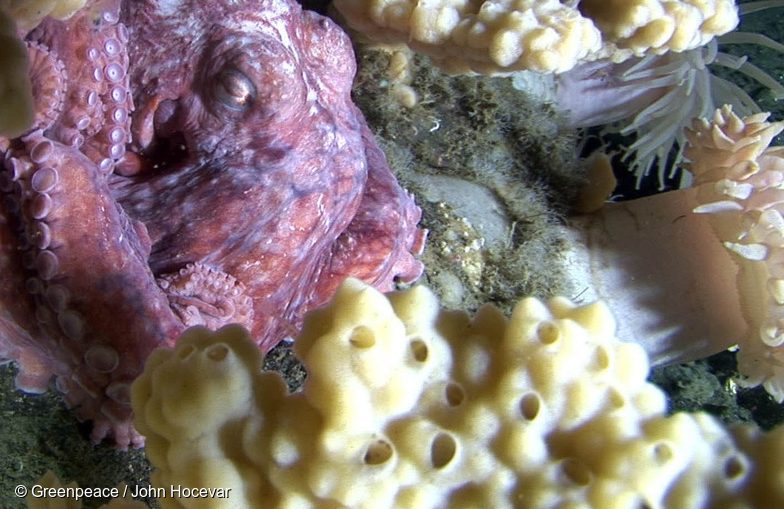We have less than two weeks to go, and it feels like anything can happen – especially if enough people speak up. Five million of us have already called for a strong Global Ocean Treaty, so the momentum is on our side.

Greenpeace USA activists light up the Brooklyn Bridge for a new Global Ocean Treaty.
While we were projecting a video on the Brooklyn Bridge calling on world leaders to adopt a strong Global Ocean Treaty, a reporter asked me how the oceans are doing. A simple question, right? But as my mouth tried to respond with a two sentence soundbite, my brain was buzzing with everything I learned back in grad school, all the scientific papers I’ve tried to absorb, the changes I’ve seen since I started scuba diving 40 years ago, and everything I’ve witnessed on Greenpeace ships and as a submarine pilot. The soundbite was ok, but I was still up at 5 am thinking about what I really wanted to say.

A giant Pacific octopus rests among anenomes and sponges at 1132′ deep during undersea research of Pribilof Canyon in the Bering Sea.
The first scientists, fishers, and Indigenous Peoples who explored and helped us understand our oceans would not recognize them today. The coastal mangrove and kelp forests and seagrass beds have been decimated. The seafloor habitats of our continental shelves have been ground into mud by bottom trawlers. The once massive populations of whales, turtles and seabirds are just a fraction of their former size. The coral reefs are dying, and most of the large fish have been eaten. Entire food webs have been restructured and simplified, with enormous cost to the resiliency and biodiversity of the oceans.
In my 18 years with Greenpeace, I have been part of a lot of battles. We have stopped Big Oil from drilling in the Arctic and the Amazon Reef, and established one of the world’s largest sanctuaries in the Ross Sea. We have documented the impacts of oil spills, plastic pollution, destructive fishing, climate change, and ocean acidification. And we have exposed and confronted so many ocean destroyers: pollock trawlers the size of ocean liners, tuna pirates, slave traders, deep sea mining companies, and fleets designed to vacuum vast schools of small fish and krill. Through all of these campaigns, we have worked side by side with a powerful network of allies, through coalitions like the High Seas Alliance, Deep Sea Conservation Coalition, and Break Free From Plastic.

Southwest Atlantic Ocean, Blue Hole, Argentina 2022.
These corporations are allowed to do almost anything they want on the high seas, the areas beyond any one country’s jurisdiction that make up 43% of the surface of the planet. When we were at a biodiversity hot spot called the Blue Hole earlier this year, hundreds of miles from the Argentine coast, our ship was surrounded by over 200 longliners, squid jiggers, and bottom trawlers – most of which had traveled thousands of miles to take advantage of the lack of regulations.
The only hope for the high seas is international collaboration. The Global Ocean Treaty being negotiated here in New York may be the best chance we have in a generation to finally turn the tide and start allowing the oceans to heal. If we get this treaty right, it will enable us to scale up ocean sanctuaries for the first time, and set aside at least 30% of the oceans by 2030. As we begin what we hope will be the final round of negotiations, the team is fiercely determined, but also worried. We are not seeing the level of urgency and ambition that is needed.
We have less than two weeks to go, and it feels like anything can happen – especially if enough people speak up. Five million of us have already called for a strong Global Ocean Treaty, so the momentum is on our side.
